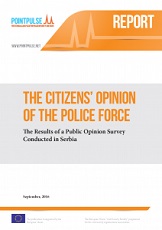2016 THE CITIZENS’ OPINION OF THE POLICE FORCE - The Results of a Public Opinion Survey Conducted in Serbia
2016 THE CITIZENS’ OPINION OF THE POLICE FORCE - The Results of a Public Opinion Survey Conducted in Serbia
Author(s): Aurelija Đan
Subject(s): Politics / Political Sciences, Politics, Civil Society, Security and defense
Published by: BCBP Beogradski centar za bezbednosnu politiku
Keywords: police force; Serbia; police sector; public opinion
Summary/Abstract: Citizens of Serbia trust the education system the most. However, the level of their confidence in other institutions is not satisfactory. More than half of the population does not trust the market inspectorate (59%), the judiciary and the Parliament (56%), the municipal and city administration (55%) and the customs (55%). Trust in the media and the civil society has not reached a satisfactory level either. Citizens are still divided over how much they trust the police. It is true that the level of trust has grown by 2% in 2016 in comparison to 2015: slightly more than half the population (54%) stated that they trust the police, while 44% do not have confidence in this institution. The problem however - just like last year – is in the fact that there is still a high percentage of those who believe that there is corruption in the police force. The percentage of those who believe that the police is corrupt has increased by 2% in comparison with the previous year, so now a total of 72% of citizens believe that corruption in the police is widespread. Citizens perceive the police in different ways, depending on their gender: they see policewomen are pretty and policemen as corrupt. The results of this survey show that citizens believe that the impact of politics on operational police work is high and that employment in the police force is usually gained through friends and relatives. Citizens still insufficiently perceive the police as a service to citizens, but it is good that more than a third of them (37%) do – which is increase from 27% as measured last year. It has already become a rule for Serbian citizens to think that corruption is most widespread among the representatives of the police force they most frequently come in contact with. This year too, they believe that corruption is most widespread in the traffic and border police. Citizens are not yet ready to report corruption in the police. It is notable that men (37%) are more willing to do so than women (31%) when required to disclose their personal information. The Anti-Corruption Agency still remains the first choice for reporting corruption. Compared to the previous year, a larger percentage of the population believes that sanctioning the perpetrators should be one of the main measures to combat corruption in the police. The number of people who believe that the political will of the Minister and officials is necessary to solve the problem of corruption in the police has decreased. One quarter of the citizens believe that the internal police control should be the main body to fight corruption in the police (24%). A quarter of the respondents see the role of civil society in the direct fight against corruption, as well as in their cooperation with the state.
Series: BCBP - Assessment of Police Integrity
- Page Count: 29
- Publication Year: 2016
- Language: English
- Content File-PDF

